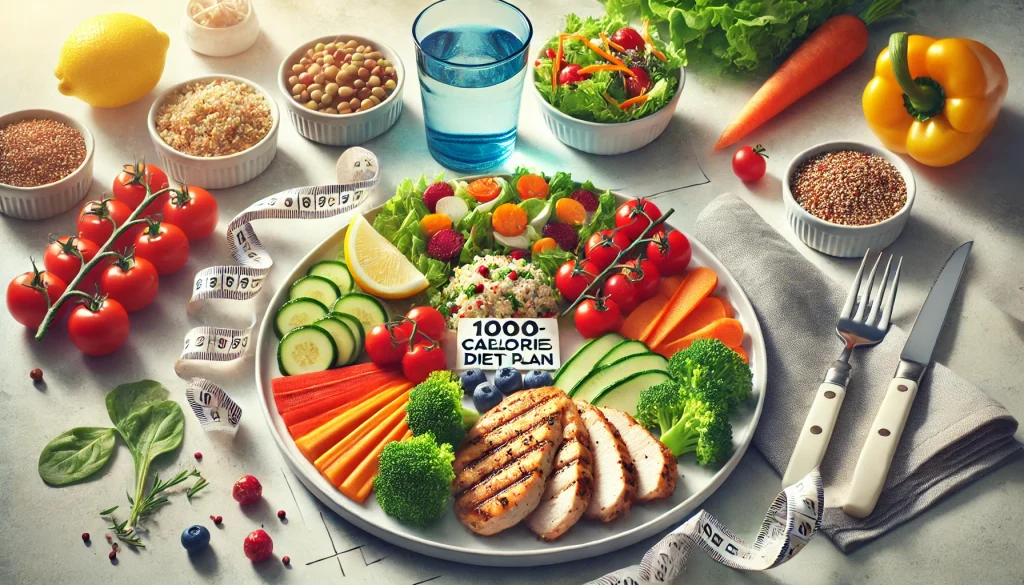
Embarking on a 1000-calorie diet can be a transformative journey for those looking to shed weight effectively. This low-calorie approach promises results but requires careful planning to ensure nutritional balance. By exploring this diet, you’ll learn how to fuel your body with fewer calories while staying healthy and energized.
What is the 1000-calorie diet?
The 1000-calorie diet is a structured, calorie-restricted eating plan that limits daily intake to 1000 calories. This approach is often used for short-term weight loss or as part of a medical recommendation under supervision. It focuses on consuming nutrient-dense, low-calorie foods to ensure your body gets the essentials while staying within the caloric limit.
How Does the 1000 Calorie Diet Work?
Reducing calorie intake below the body’s energy needs creates a caloric deficit. This deficit forces your body to tap into stored fat for energy, leading to weight loss. However, a 1000-calorie diet is quite restrictive, which makes it essential to choose high-quality, nutrient-dense foods to prevent deficiencies.
Benefits of the 1000 Calorie Diet
- Rapid Weight Loss: Helps achieve noticeable weight loss within weeks.
- Improved Portion Control: Encourages mindful eating habits.
- Detox Benefits: By focusing on fresh, unprocessed foods, your body experiences a natural detox.
- Simplicity: A structured plan reduces decision fatigue.
Risks and Precautions
While the 1000-calorie diet can be effective, it’s not suitable for everyone. Risks include:
- Nutritional deficiencies if not well-planned.
- Fatigue and dizziness due to low energy intake.
- Slowed metabolism over prolonged use.
Tip: Always consult a healthcare professional before starting a low-calorie diet, especially if you have medical conditions or are pregnant.
Who Can Benefit from a 1000 Calorie Diet?
This diet is ideal for:
- Individuals looking for short-term weight loss goals.
- Those who need a medically supervised low-calorie regimen.
However, it is not recommended for children, pregnant women, or highly active individuals due to higher energy requirements.
Creating a Balanced 1000 Calorie Meal Plan
Key Components
- Lean Proteins: Chicken breast, tofu, fish, eggs.
- Non-Starchy Vegetables: Broccoli, spinach, zucchini.
- Healthy Fats: Avocado, olive oil, nuts (in moderation).
- Low-Glycemic Carbs: Quinoa, sweet potatoes, oats.
Sample Meal Plan
| Meal | Calories | Examples |
|---|---|---|
| Breakfast | ~250 | Scrambled egg whites with spinach and whole-grain toast |
| Snack | ~100 | Greek yogurt with a few almonds |
| Lunch | ~350 | Grilled chicken salad with olive oil dressing |
| Snack | ~50 | A small apple |
| Dinner | ~250 | Baked salmon with steamed broccoli and a lemon wedge |
Tips for Success on a 1000 Calorie Diet
- Meal Prep: Plan meals in advance to avoid overeating.
- Track Intake: Use apps to monitor calorie consumption.
- Hydration: Drink plenty of water to support metabolism and curb hunger.
- Listen to Your Body: Stop if you feel excessively weak or dizzy.
1000 Calorie Diet and Exercise
Engaging in high-intensity workouts on such a low-calorie diet may lead to exhaustion. Stick to light exercises like walking, yoga, or stretching to complement your weight loss without overburdening your body.
FAQs
What foods should I avoid on a 1000 calorie diet?
Avoid high-calorie, low-nutrient foods like sugary drinks, fried snacks, and processed meals.
Can I follow a 1000 calorie diet for long-term weight loss?
No, it’s not recommended for long-term use as it can slow metabolism and lead to nutritional deficiencies.
What happens if I exceed 1000 calories occasionally?
Occasional indulgences are fine, but consistency is key for results. Plan to compensate with healthier meals.
Is a 1000 calorie diet suitable for everyone?
No, it is not suitable for children, pregnant women, or those with high energy needs.
Can I drink coffee or tea on a 1000 calorie diet?
Yes, but avoid adding sugar or high-calorie creamers. Black coffee and herbal teas are best.
How can I ensure I’m getting enough nutrients?
Focus on nutrient-dense foods, and consider taking a multivitamin if recommended by a doctor.
Conclusion
The 1000 calorie diet can be an effective way to achieve short-term weight loss goals when done correctly. By focusing on nutrient-rich foods, maintaining portion control, and consulting a healthcare professional, you can ensure a healthy and sustainable approach. Remember, every body is different, and listening to yours is the key to success.